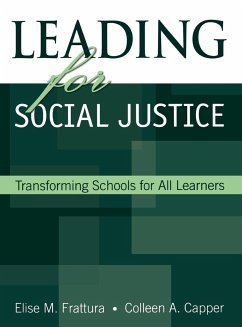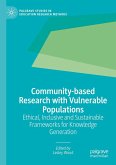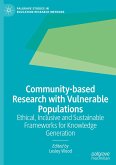Schade – dieser Artikel ist leider ausverkauft. Sobald wir wissen, ob und wann der Artikel wieder verfügbar ist, informieren wir Sie an dieser Stelle.
- Gebundenes Buch
- Merkliste
- Auf die Merkliste
- Bewerten Bewerten
- Teilen
- Produkt teilen
- Produkterinnerung
- Produkterinnerung
A step-by-step process for raising the achievement of English language learners and students with special needs and for integrating schoolwide change through proactive support services that benefit all students.
Andere Kunden interessierten sich auch für
![Creating Inclusive Learning Environments for Young Children Creating Inclusive Learning Environments for Young Children]() Clarissa WillisCreating Inclusive Learning Environments for Young Children76,99 €
Clarissa WillisCreating Inclusive Learning Environments for Young Children76,99 €![Research-Based International Student Involvement Research-Based International Student Involvement]() Research-Based International Student Involvement127,99 €
Research-Based International Student Involvement127,99 €![Gifted?: The shift to enrichment, challenge and equity Gifted?: The shift to enrichment, challenge and equity]() Morgan WhitfieldGifted?: The shift to enrichment, challenge and equity19,99 €
Morgan WhitfieldGifted?: The shift to enrichment, challenge and equity19,99 €![Educating for Radical Social Transformation in the Climate Crisis Educating for Radical Social Transformation in the Climate Crisis]() Stuart TannockEducating for Radical Social Transformation in the Climate Crisis97,99 €
Stuart TannockEducating for Radical Social Transformation in the Climate Crisis97,99 €![Community-based Research with Vulnerable Populations Community-based Research with Vulnerable Populations]() Community-based Research with Vulnerable Populations119,99 €
Community-based Research with Vulnerable Populations119,99 €![Educating for Radical Social Transformation in the Climate Crisis Educating for Radical Social Transformation in the Climate Crisis]() Stuart TannockEducating for Radical Social Transformation in the Climate Crisis97,99 €
Stuart TannockEducating for Radical Social Transformation in the Climate Crisis97,99 €![Community-based Research with Vulnerable Populations Community-based Research with Vulnerable Populations]() Community-based Research with Vulnerable Populations119,99 €
Community-based Research with Vulnerable Populations119,99 €-
-
A step-by-step process for raising the achievement of English language learners and students with special needs and for integrating schoolwide change through proactive support services that benefit all students.
Produktdetails
- Produktdetails
- Verlag: Corwin
- Seitenzahl: 342
- Erscheinungstermin: 18. April 2007
- Englisch
- Abmessung: 286mm x 221mm x 23mm
- Gewicht: 1122g
- ISBN-13: 9780761931775
- ISBN-10: 0761931775
- Artikelnr.: 22398383
- Herstellerkennzeichnung
- Libri GmbH
- Europaallee 1
- 36244 Bad Hersfeld
- gpsr@libri.de
- Verlag: Corwin
- Seitenzahl: 342
- Erscheinungstermin: 18. April 2007
- Englisch
- Abmessung: 286mm x 221mm x 23mm
- Gewicht: 1122g
- ISBN-13: 9780761931775
- ISBN-10: 0761931775
- Artikelnr.: 22398383
- Herstellerkennzeichnung
- Libri GmbH
- Europaallee 1
- 36244 Bad Hersfeld
- gpsr@libri.de
Elise Frattura is an assistant professor in the Department of Exceptional Education and Educational Administration and associate dean for the School of Education at the University of Wisconsin-Milwaukee. She teaches courses in administration of student services, organizational leadership, and special education law. Frattura researches and publishes in the area of nondiscrimination law, integrated comprehensive services for all learners, and the theoretical underpinnings of educational segregation. Coauthor of Meeting the Needs of All Learners: How Leaders Go Beyond Inclusion (Corwin Press 2000), Frattura works with school districts across the country to assist in the movement from programs to services for all learners.
Preface
Acknowledgments
Introduction
Cornerstone 1. Core Principles: Focusing on Equity
1. Integrated Comprehensive Services (ICS)
2. Leadership for ICS and Social Justice
3. Developing and Living a School/District Mission for ICS and Social
Justice
4. Data for Consciousness, Decision Making, and Evaluation
Cornerstone 2. Establishing Equitable Structures: Location and Arrangement
of Educational Services
5. Teams for Shared Decision-Making, Staff Design, and Student Support
6. Creating a School Climate That Supports Students With Challenging
Behaviors
7. School Involvement With Families
Cornerstone 3. Providing Access to High-Quality Teaching and Learning:
Building Teacher Capacity and Curriculum and Instruction
8. Teaching Within ICS and for Social Justice
9. Students Who Significantly Challenge Our Teaching
10. English Language Learners and ICS (co-written by Martin Scanlan)
11. Developing Teacher Capacity via Hiring, Evaluation, and Teacher
Collaboration
Cornerstone 4. Implementing Change: Funding and Policy
12. Reallocating Resources for ICS and Social Justice
13. Developing School District Policy and Precedures to Leverage ICS and
Social Justice
14. Using State and Federal Regulations to Leverage ICS and Social Justice
15. The Messiness of Change Toward ICS and Social Justice
References
Appendices
Index
Acknowledgments
Introduction
Cornerstone 1. Core Principles: Focusing on Equity
1. Integrated Comprehensive Services (ICS)
2. Leadership for ICS and Social Justice
3. Developing and Living a School/District Mission for ICS and Social
Justice
4. Data for Consciousness, Decision Making, and Evaluation
Cornerstone 2. Establishing Equitable Structures: Location and Arrangement
of Educational Services
5. Teams for Shared Decision-Making, Staff Design, and Student Support
6. Creating a School Climate That Supports Students With Challenging
Behaviors
7. School Involvement With Families
Cornerstone 3. Providing Access to High-Quality Teaching and Learning:
Building Teacher Capacity and Curriculum and Instruction
8. Teaching Within ICS and for Social Justice
9. Students Who Significantly Challenge Our Teaching
10. English Language Learners and ICS (co-written by Martin Scanlan)
11. Developing Teacher Capacity via Hiring, Evaluation, and Teacher
Collaboration
Cornerstone 4. Implementing Change: Funding and Policy
12. Reallocating Resources for ICS and Social Justice
13. Developing School District Policy and Precedures to Leverage ICS and
Social Justice
14. Using State and Federal Regulations to Leverage ICS and Social Justice
15. The Messiness of Change Toward ICS and Social Justice
References
Appendices
Index
Preface
Acknowledgments
Introduction
Cornerstone 1. Core Principles: Focusing on Equity
1. Integrated Comprehensive Services (ICS)
2. Leadership for ICS and Social Justice
3. Developing and Living a School/District Mission for ICS and Social
Justice
4. Data for Consciousness, Decision Making, and Evaluation
Cornerstone 2. Establishing Equitable Structures: Location and Arrangement
of Educational Services
5. Teams for Shared Decision-Making, Staff Design, and Student Support
6. Creating a School Climate That Supports Students With Challenging
Behaviors
7. School Involvement With Families
Cornerstone 3. Providing Access to High-Quality Teaching and Learning:
Building Teacher Capacity and Curriculum and Instruction
8. Teaching Within ICS and for Social Justice
9. Students Who Significantly Challenge Our Teaching
10. English Language Learners and ICS (co-written by Martin Scanlan)
11. Developing Teacher Capacity via Hiring, Evaluation, and Teacher
Collaboration
Cornerstone 4. Implementing Change: Funding and Policy
12. Reallocating Resources for ICS and Social Justice
13. Developing School District Policy and Precedures to Leverage ICS and
Social Justice
14. Using State and Federal Regulations to Leverage ICS and Social Justice
15. The Messiness of Change Toward ICS and Social Justice
References
Appendices
Index
Acknowledgments
Introduction
Cornerstone 1. Core Principles: Focusing on Equity
1. Integrated Comprehensive Services (ICS)
2. Leadership for ICS and Social Justice
3. Developing and Living a School/District Mission for ICS and Social
Justice
4. Data for Consciousness, Decision Making, and Evaluation
Cornerstone 2. Establishing Equitable Structures: Location and Arrangement
of Educational Services
5. Teams for Shared Decision-Making, Staff Design, and Student Support
6. Creating a School Climate That Supports Students With Challenging
Behaviors
7. School Involvement With Families
Cornerstone 3. Providing Access to High-Quality Teaching and Learning:
Building Teacher Capacity and Curriculum and Instruction
8. Teaching Within ICS and for Social Justice
9. Students Who Significantly Challenge Our Teaching
10. English Language Learners and ICS (co-written by Martin Scanlan)
11. Developing Teacher Capacity via Hiring, Evaluation, and Teacher
Collaboration
Cornerstone 4. Implementing Change: Funding and Policy
12. Reallocating Resources for ICS and Social Justice
13. Developing School District Policy and Precedures to Leverage ICS and
Social Justice
14. Using State and Federal Regulations to Leverage ICS and Social Justice
15. The Messiness of Change Toward ICS and Social Justice
References
Appendices
Index








